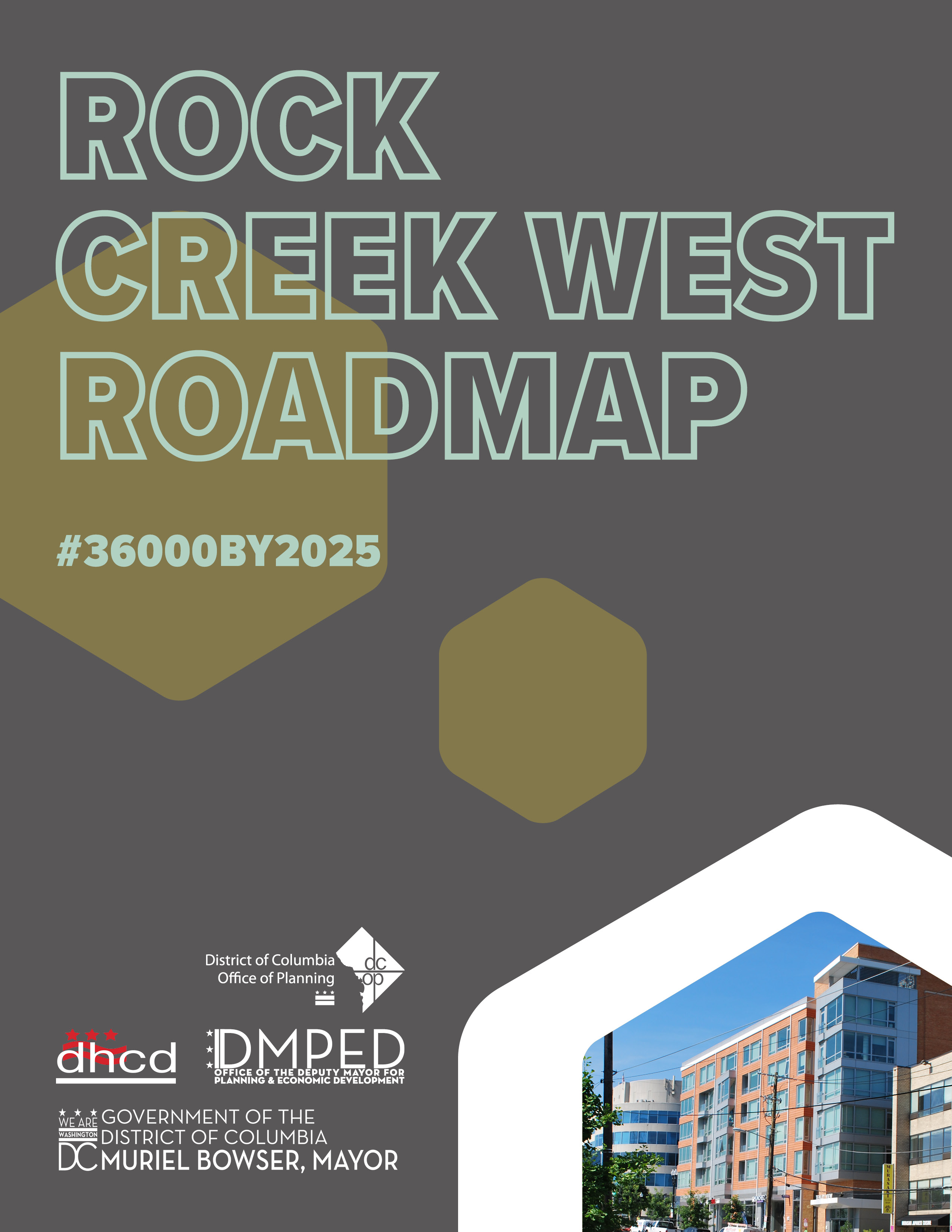This page will host the reports and analyses completed as part of this Housing Framework for Equity and Growth initiative as well as highlight other important reports from our District agency and regional partners.
Rock Creek West Roadmap 2022 Update
The Rock Creek West Roadmap 2022 Update highlights progress the District has made towards the goals presented in Rock Creek West Roadmap.
Rock Creek West Roadmap
The Rock Creek West Roadmap outlines how we can achieve our ambitious housing goals in Rock Creek West through leveraging housing tools, making targeted investments, and developing neighborhood plans.
Housing Equity Report
The Housing Equity Report provides goals for the equitable distribution of affordable housing in Washington, DC, supporting Mayor Muriel Bowser’s vision for creating 36,000 new housing units by 2025. The report is the first in a series that will comprise the Housing Framework for Equity and Growth. The framework is a cutting-edge effort that will examine factors across multiple scales, design typologies, and resident experiences to generate recommendations that can increase housing affordability and opportunity for all residents.
Read the Housing Equity Report here or check out a short summary of the report here. You can also learn more about the current distribution of affordable housing by the District's Planning Areas in the report or by the District's Advisory Neighborhood Commission (ANC) areas here.
You can also view a video about the Housing Framework for Equity and Growth and our work to increase affordable housing in the District below.
External Publications
Planning Area Specific Housing Reports
Urban Land Institute
The Urban Land Institute Advisory Services Panel's Affordable Housing in Washington, DC report focuses specifically on the Rock Creek West Planning Area and provides recommendations on how the District and its partners could address the barriers to new affordable housing production, leverage existing tools and policies to overcome those barriers, and develop a strategy for affordable housing production. The report highlights opportunities to create new housing, streamline and improve the development process, and gain community support through outreach, marketing, and education.
Washington Region Housing Reports
Metropolitan Washington Council of Governments (MWCOG)
The Future of Housing in Greater Washington highlights the efforts by area officials and housing and planning directors to work together at COG to address the region's unmet housing needs. The report sets an ambitious target of adding at least 320,000 housing units between 2020 and 2030, an additional 75,000 units beyond the units already predicted to be built in the region for this period. MWCOG also created goals for establishing 75 percent of those units near Activity Centers or high-capacity transit and ensuring 75 percent of new housing should be affordable to low- and moderate-income households.
Urban Land Institute Washington
Increasing Housing Supply and Attainability: Improving Rules & Engagement to Build More Housing examines two critical factors that affect the speed and certainty of the development process: navigating the local regulatory and approval processes, and gaining community acceptance of development projects. The report describes the private sector risks associated with the development process, the changing demographics and consumer preferences influencing housing development, the challenges and benefits of community engagement, and the entitlement and approval processes that govern project approvals.
Urban Land Institute Washington
Increasing Housing Supply and Attainability: Improving Rules & Engagement to Build More Housing examines two critical factors that affect the speed and certainty of the development process: navigating the local regulatory and approval processes, and gaining community acceptance of development projects. The report describes the private sector risks associated with the development process, the changing demographics and consumer preferences influencing housing development, the challenges and benefits of community engagement, and the entitlement and approval processes that govern project approvals.
Urban Institute
Meeting the Washington Region’s Future Housing Needs is an analysis of the current housing supply and predicted population growth forecast in the region. The report states that to ensure the region’s future economic growth and prosperity, the region must produce at least 374,000 more housing units by 2030 and create at least 40 percent more housing to meet the needs of moderate-income households. The report highlights that jurisdictions within the region will need to leverage their existing housing tools and learn from each other to implement highly effective policies to accelerate housing production.
Related DC Government Publications
DC Department of Housing and Community Development (DHCD)
HUD 2018/DHCD 2019 Consolidated Annual Performance Evaluation Report (Draft) includes performance data on how the agency spent U.S. Department of Housing and Urban Development funds including; Community Development Block Grant, HOME Investment Partnership, Emergency Solutions Grant, and Housing Opportunity for People with AIDS funds. The report also provides information on DHCD's progress towards strategic goals and priorities.
Analysis of Impediments to Fair Housing Choice Draft sets out a number of specific goals and actions steps for the District to advance fair housing, by expanding open housing choice and taking steps to remedy residential exclusion, addressing cost pressures and housing instability, and channeling investments to the communities where they are needed. The completion of this analysis is required of all localities receiving specific funding from the U.S. Department of Housing and Urban Development.
FY 2018 Inclusionary Zoning Annual Report provides an overview of the District's Inclusionary Zoning (IZ) program in Fiscal Year 2018 and highlights the number, type, and income-level of IZ units produced in that year.
The DC Interagency Council on Homelessness' Homeward DC Strategic Plan (2015-2020) lays out the District's vision to end long-term homelessness in the District of Columbia and ensure that homelessness in the District will be a rare, brief, and non-recurring experience. The strategic plan identifies five key strategies to achieve this vision including to develop a more effective crisis response system, increase the supply of affordable and supportive housing, remove barriers to affordable and supportive housing, increase the economic security of households in our system, and increase prevention efforts to stablize households before housing loss occurs.
DC Housing Authority (DCHA)
Our People, Our Plan, Our Portfolio -- DCHA's 20-Year Transformation Plan details the first phase of the agency's strategic direction over the next two decades to stabilize its entire public housing portfiolio and address conditions across 14 properties and 2,610 public housing units most urgently in need of work to ensure the health and safety of residents and the long term viability of those housing units. The report highlights DCHA's Early Action Strategy which includes stabilizing four properties with 463 units and initiating the process of comprehensive modernization and/or redevelopment of the remaining ten priorities through a long-term strategy.
Office of the Deputy Mayor for Planning and Economic Development (DMPED)
DC Housing Data Blog is a blog that highlights analysis on housing hte District, as well as on the many factors that influence housing -- such as jobs, businesses, demographics, and the economy.
An Assessment of the Need for Large Family Units in the District of Columbia provides a more thorough understanding of any gaps in the supply of and demand for large units in the District. Recognizing that housing is fundamental to helping families thrive in the District, this study explores the questions: is there a need for an increase in the rate of large unit production and preservation in the District? If so, where, what kind, at what price, and for whom?
DC Housing Survey Report: A Supplement to the Assessment of the Need for Large Units in the District of Columbia reports on the 2018 DC Housing Survey, a large survey panel conducted at a ward level to learn more about residents and their housing experiences. The DC Housing Survey and the key findings in the report include how likely residents feel that they will move soon, their desires to move or stay, the level of instability they feel with their current housing, and the reasons behind their next move. DMPED also created the DC Housing Survey Insights dashboard and the Housing for Families in the District: The Affordable Family-Sized Unit Study in 9 Charts blog post to provide helpful visualizations of the key findings in the DC Housing Survey.
Office-to-Affordable Housing Task Force Report examines the potential for converting vacant office space to affordable housing to address the pressing housing shortage in the District of Columbia. In response to reports drawing attention to the large amount of vacant office space in the region and the District, the Council of the District of Columbia passed the Office to Affordable Housing Task Force Establishment Act of 2017, which commissioned a Task Force to answer three questions around feasibility, policy, and regulatory considerations, as well as the cost of office-to-residential conversions.
DC Department of Health (DC Health)
Health Equity Report for the District of Columbia 2018 is a comprehensive report focusing on social and structural determinants of health in the District. The report highlights key nontraditional factors that affect health, including education, employment, income, housing, transportation, food environment, medical care, outdoor environment, and community safety; the report analyzes the disparities of these key drivers in 51 statistical neighborhoods across the District. Key insights in the report show that overall, clinical care drives only 20 percent of population health outcomes, while the remaining 80 percent is generated by non-clinical factors.

 MENU
MENU
